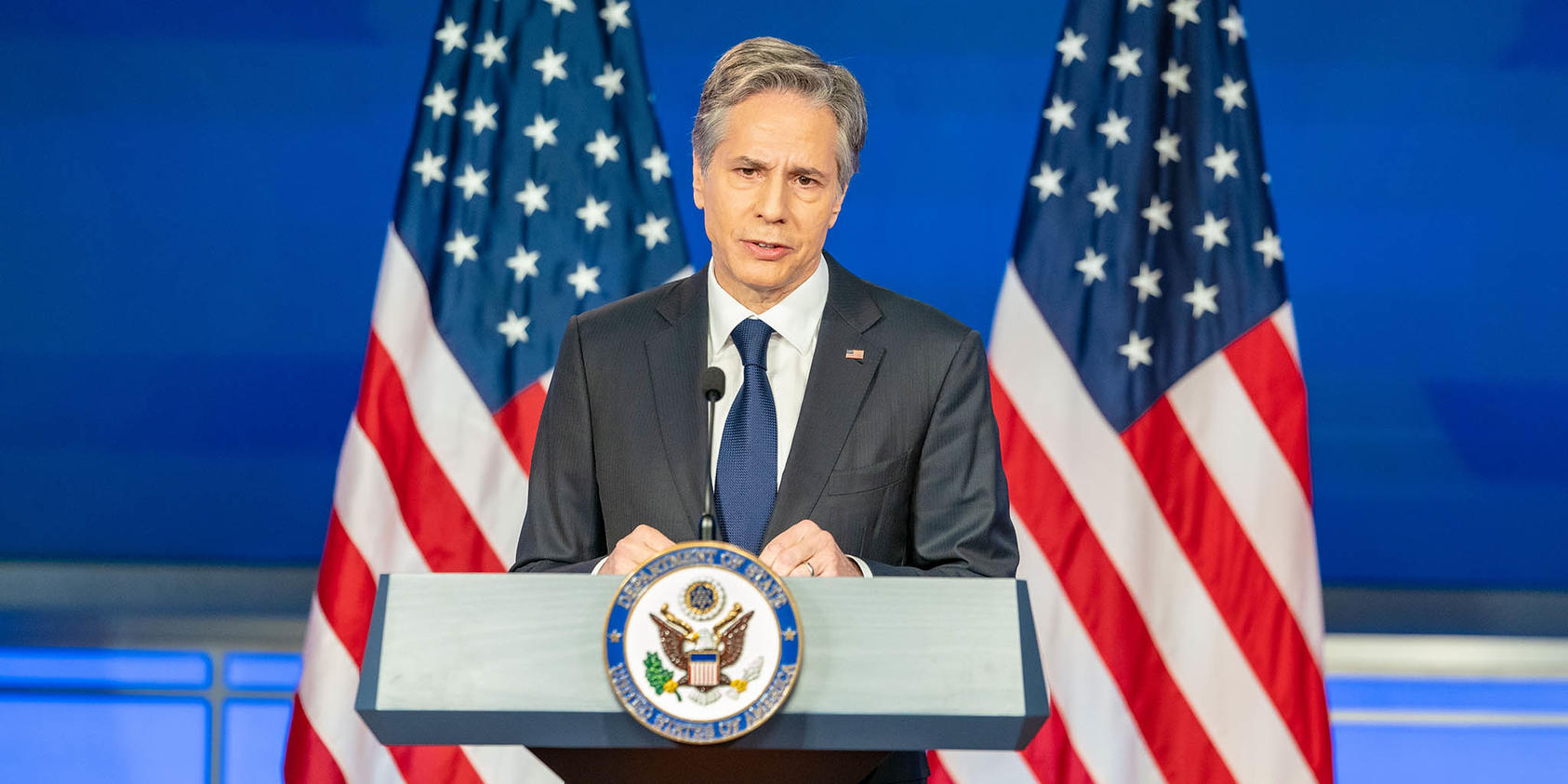Blinken lays out three-part U.S. approach to China. But what’s missing?
He said the U.S. would invest in strengths, align with allies and compete over core interests, but said less about collaborating with Beijing.
Secretary of State Antony Blinken delivered a long-awaited speech last week outlining the administration’s China strategy. His remarks detailed a tough approach to China that nevertheless left the door open to diplomacy between the two countries on issues of common interest. Blinken described China as the “most serious long-term challenge to the international order” but still “integral to the global economy and to our ability to solve challenges from climate to COVID.”

‘Invest, Align, Compete’
To manage the “complex and consequential” U.S.-China relationship, Blinken delineated a three-pillar approach he encapsulated in the phrase “invest, align, compete.” The “invest” pillar calls for the United States to double-down on investments in its historical strengths: its economic competitiveness, capacity for innovation and democratic political system. Economic investments would be made as part of a “modern industrial strategy” aimed at enhancing the United States’ technological edge — including in the fields of artificial intelligence, biotechnology and quantum computing, areas where China appears to be pulling ahead of the United States.
The United States' democratic political system is a “core source of national strength that we’ll be relying on in this decisive decade,” Blinken said, noting that American democracy is a "core asset" in the U.S. "contest" with China. Blinken also put another national strength front and center: Chinese Americans, who have made “invaluable contributions” to America “for generations.” At a time when anti-Asian hate is on the rise in the United States, Secretary Blinken also used the speech to make the point that racism and hate have no place in the United States.
The “align” pillar focuses on strengthening U.S. alliances with partners with shared interests and who are opposed to China’s authoritarian system and overseas development policies. Blinken's speech came on the heels of President Joe Biden's trip to Asia where the president met with Quad leaders, rolled out a new economic vision for the region and made an unanticipated statement on Taiwan. Reinforcing the president's message in Asia, Blinken underscored the importance of U.S. alliances and partnerships in “advanc[ing] a shared vision of the future” and highlighted U.S. regional initiatives, including the Quad, AUKUS and the Indo-Pacific Economic Framework for Prosperity.
Secretary Blinken also underscored the centrality of human rights in the administration's foreign policy, saying that the United States will continue to call for an end to a range of Chinese human rights abuses and repressive measures in Hong Kong. Although President Biden had appeared to break with decades of American policy by declaring that the United States has a "commitment" to defend Taiwan — a statement his administration later walked back — Blinken reinforced longstanding U.S. policy toward Taipei. He clarified that the United States remains committed to the "one China" policy, whereby the United States recognizes the People's Republic of China as the sole legal government of China, having "acknowledged" the “one China” position of both sides of the Taiwan Strait.
Finally, the speech called for the United States to “compete” against China to defend America’s core interests, including upholding the international rules-based order, ensuring freedom of navigation and overflight, and advancing human rights. In line with the 2022 National Defense Strategy, Secretary Blinken reiterated the administration’s commitment to “integrated deterrence,” relying on all instruments of national power — not just the military — to deter China from using force to achieve its ambitions in the Indo-Pacific. This includes against Taiwan. On this note, Secretary Blinken reiterated that the United States’ “one China” policy has not changed.
Whither Cooperation?
Notably absent from the strategy Blinken put forward was a possible fourth pillar: Collaborate. During the first year of the Biden administration, a willingness to seek collaboration with Beijing where possible had distinguished its approach to China from the comprehensive decoupling approach of the Trump administration. For its part, Beijing has shown little interest in such collaboration. Blinken's remarks did address a list of issues where the United States and China might work together, such as climate change, COVID-19, nuclear proliferation, illicit narcotics, global food insecurity and the need for economic coordination on the global economy. However, Blinken's speech said little that suggested negotiations might be on the horizon with China on the tariffs and trade commitments the Trump administration established. Some administration officials, like Treasury Secretary Janet Yellen, have come out against the tariffs amid soaring inflation. Others, like U.S. Trade Representative Katherine Tai, want to see these tariffs upheld.
While the speech drew mixed reactions from the American policy community, it drew fire from Beijing. China’s Ministry of Foreign Affairs spokesperson Hua Chunying called it “duplicitous,” tweeting an 11-point rebuttal to the speech reprinted in China's state-run Global Times. China also increased demonstrations of its military capabilities in the region, which included the first joint drill with Russia since the invasion of Ukraine, flying strategic bombers over the Sea of Japan, and sending 30 fighter jets into Taiwan’s air defense identification zone.
Although Secretary Blinken’s speech broke little new ground, it nevertheless provided a useful articulation of the administration’s approach to China and demonstrated that China and the broader Indo-Pacific region are top priorities for the administration, even amid the war in Ukraine. Implicit in the secretary’s remarks was a broader diplomatic appeal. Blinken was careful to state that the United States recognizes that not all countries will share its view of China and that other nations have their own complex relationships with Beijing driven by their own interests. But, in its strategic competition with China, the United States can demonstrate that it has the more compelling model.



